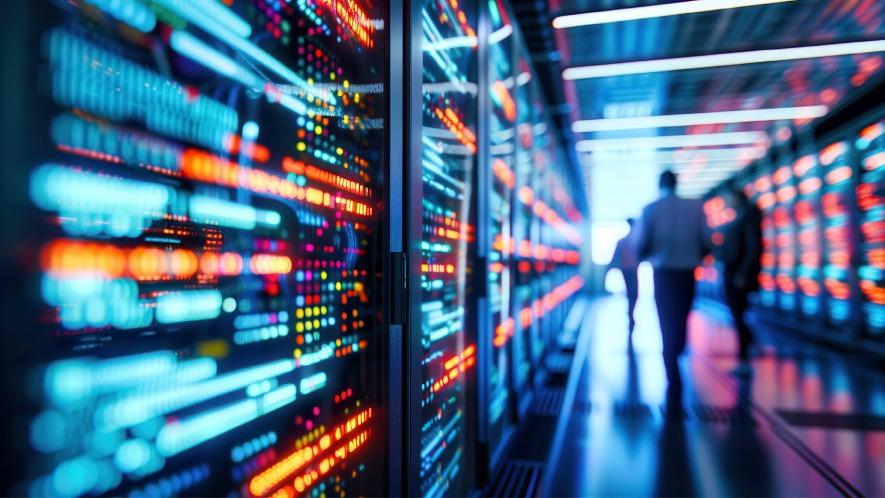
SPG, ENERGY & DATA CENTER INDUSTRY NEWS
4/8/2025
How Data Centers Became HOT Real Estate Investments
The U.S. is home to the majority of the world’s data centers with just under 3,000, compared to the country with the next-closest amount, United Kingdom, at just 360. This concentration has brought up the value of the land where the data centers are built. Prices are soaring as much as ten times the original value in one Vint Hill, Virginia case. So how did this land zoned for data construction get so valuable, and will investors keep pouring money into the infrastructure that supports AI while potentially upsetting nearby residents?
4/6/2025
The Problem with Wind Energy
4/5/2025
How Texas’ Tough Winter Exposed U.S. Power Grid Problems
Texas had a rough winter in 2021. In mid-February, with temperatures dropping to the single digits, demand for electricity hit a record high throughout Texas. Supply ran short, causing the state’s electric grid operator to implement rolling power outages. At the height of the crisis, more than 4.5 million customers lost power. The freak winter storm caused neighboring states such as Louisiana, Oklahoma, Arkansas and Kansas to also impose rolling blackouts. Texas residents shivered in the cold, as outages lasted for days at a time. They lost access to water. Some resorted to turning on their cars in their garages to keep warm then died due to carbon monoxide poisoning. The historic breakdown was a wake-up call — if the power grid in Texas was so fragile, what about the rest of the United States? The U.S. has faced a 67% increase in weather-related power outages since 2000, according to data from Climate Central. Part of the problem is an aging infrastructure. Most of today’s power grid was built in the 1950s and ’60s, with the hopes that it would last for 50 years.
4/3/2025
Coal-fired power plant, now retired, to become massive gas-powered campus for AI, data centers
Big Tech wants to plug data centers right into power plants. Utilities say it’s not fair
LoreMorey Wolfson helped spearhead the development of the recently released Colorado Renewable Energy Society CRES) policy statement on Hyperscale Data Centers (https://www.cres-energy.org/policy.html
Hyperscale Data Centers (HDCs) are projected to expand at a rapidly growing rate over the next several years, primarily driven by the deployment of Artificial Intelligence (AI) technology that requires significantly more computing power and energy than conventional and smaller data center processing. The Electric Power Research Institute, a research arm of investor-owned utilities, concluded that AI will drive growth of HDCs that could double their electric demand by 2030. Internet queries using AI require about 10 times the electricity of traditional Internet searches. The projected load growth from HDCs poses significant challenges to our transition path towards renewable energy and could have negative impacts on ratepayers.
The key positions of the CRES Policy Statement are:
• Oppose further subsidies to hyperscale data centers (HDCs);
• Favor requirements that HDCs secure renewable energy sources to match or exceed their energy use;
• Require HDCs to pay upfront for any additional renewable energy generation and related transmission on the power system caused by their energy use;
• Ensure that Colorado ratepayers are protected by requiring HDCs to make an up-front termination liability payment, and a decommissioning bond should they experience a downturn.
About the speaker:
Morey Wolfson’s career included many years at the Colorado Public Utilities Commission, the National Renewable Energy Laboratory, and the Colorado Governor’s Energy Office.
Organized by the Boulder chapter of the Colorado Renewable Energy Society, recorded on Jan 21, 2025 at the University of Colorado, Sustainability, Energy and Environment Community (SEEC). Contact: bcres@cres-energy.org, cres-energy.org/. Video production pro bono by Martin Voelker.
ABOUT CRES – cres-energy.org The Colorado Renewable Energy Society (CRES) is dedicated to the advancement of all forms of renewable energy (RE), energy efficiency (EE), and their synergy with sustainability and economic development. Learn more at cres-energy.org.
CRES features several local monthly speaker series throughout the state, provides speakers, experts, and workshops, and weighs in on state energy policy.
3/10/2025
CASE STUDY – ECONOMIC, ENVIRONMENTAL & SOCIAL IMPACTS OF DATA CENTERS IN THE UNITED STATES – Including Statewide Impacts for Arizona, Ohio, and Virginia.
DCC is the membership association for the data center industry and represents the industry’s interests through a range of activities, including public policy advocacy, thought leadership, stakeholder outreach, and community engagement.
Click Here for: Impact Case Study / Audit
3/5/2025
TrendsTalk | Data Centers: Growth, Challenges, and Economic Impact
2/25/2025
DATA CENTERS at the Crossroads of Technology and Resilience (Publication by PwC)
The data center industry is growing exponentially. With investments projected to reach $1 trillion by 2027, the rapid advancements in artificial intelligence (AI) and other transformative technologies are reshaping how businesses and governments approach digital infrastructure. This rapid expansion is fueled by the interconnected efforts of hyperscalers, operators, developers, energy and network providers, original equipment manufacturers (OEMs) and infrastructure investors. These data center ecosystem players are addressing the industry’s core challenges — scalability, reliability and efficiency — while enabling continued delivery of innovative solutions. (Publication)
2/23/2025
DATA CENTER WORLD 2025 – April 14-17 2025 Washington DC
Meet industry leaders and explore cutting-edge Data Center solutions at Data Center World. Discover the latest trends in Data.
The Data Center industry is at an inflection point. Demand is multiplying while supply is constricting. The workforce is turning over, and how we get things done is evolving. But perhaps the greatest challenge of all is power—how we source it, sustain it, and scale it to meet an AI-driven future. Energy availability, grid constraints, sustainability mandates, and geopolitical instability are reshaping the industry at an unprecedented pace.
Enter Data Center World 2025—the only global industry event that combines real-world practitioner and thought leader expertise with in-depth research, data-driven insights, and access to a full spectrum of solution providers driving the future of data centers and digital infrastructure.
Our 2025 focus is on next-generation power architectures, sustainable energy solutions, data center IT infrastructure, mission-critical facilities management, AI-driven power optimization, emerging construction practices, and the tools and technologies needed to build and operate AI factories.
The pace of innovation in the data center space is staggering. Powering this evolution is the challenge—and the opportunity—of a generation. Attend the one industry event that covers the full spectrum of data center trends that matter most.
2/21/2025
70% of Data Center Growth could be met by ”Power Couples,’ say Rocky Mountain’s Uday Varadarajan
Uday Varadarajan, Rocky Mountain Institute, joins ‘Power Lunch’ to discuss powering the AI race with data centers in a way that doesn’t disrupt the energy grid.
7/28/2024
How The Massive Power Draw Of Generative AI Is Overtaxing Our Grid
July 28, 2024 #CNBC
There’s more than 8,000 data centers globally, but it’s not nearly enough to keep up with the power needs of generative AI. One ChatGPT query takes about 10 times as much energy as a typical Google search. Training one large language model can produce as much CO2 as the entire lifetime of five gas-powered cars and use as much water as a small country. Even if we generate enough power, our aging grid is increasingly unable to handle transmitting it to where it’s needed. That’s why data center companies like Vantage are building closer to where power is generated, while the industry invests in alternative energy source and creative ways to harden the grid.
Hyperscale Data Centers - Bad News for Ratepayers & Environment?
Jan 28, 2025
LoreMorey Wolfson helped spearhead the development of the recently released Colorado Renewable Energy Society CRES) policy statement on Hyperscale Data Centers (https://www.cres-energy.org/policy.html
Hyperscale Data Centers (HDCs) are projected to expand at a rapidly growing rate over the next several years, primarily driven by the deployment of Artificial Intelligence (AI) technology that requires significantly more computing power and energy than conventional and smaller data center processing. The Electric Power Research Institute, a research arm of investor-owned utilities, concluded that AI will drive growth of HDCs that could double their electric demand by 2030. Internet queries using AI require about 10 times the electricity of traditional Internet searches. The projected load growth from HDCs poses significant challenges to our transition path towards renewable energy and could have negative impacts on ratepayers.
The key positions of the CRES Policy Statement are:
• Oppose further subsidies to hyperscale data centers (HDCs);
• Favor requirements that HDCs secure renewable energy sources to match or exceed their energy use;
• Require HDCs to pay upfront for any additional renewable energy generation and related transmission on the power system caused by their energy use;
• Ensure that Colorado ratepayers are protected by requiring HDCs to make an up-front termination liability payment, and a decommissioning bond should they experience a downturn.
About the speaker:
Morey Wolfson’s career included many years at the Colorado Public Utilities Commission, the National Renewable Energy Laboratory, and the Colorado Governor’s Energy Office.
Organized by the Boulder chapter of the Colorado Renewable Energy Society, recorded on Jan 21, 2025 at the University of Colorado, Sustainability, Energy and Environment Community (SEEC). Contact: bcres@cres-energy.org, cres-energy.org/. Video production pro bono by Martin Voelker.
ABOUT CRES – cres-energy.org The Colorado Renewable Energy Society (CRES) is dedicated to the advancement of all forms of renewable energy (RE), energy efficiency (EE), and their synergy with sustainability and economic development. Learn more at cres-energy.org.
CRES features several local monthly speaker series throughout the state, provides speakers, experts, and workshops, and weighs in on state energy policy.
